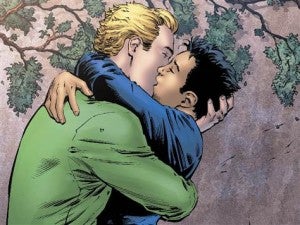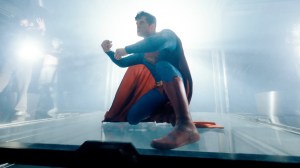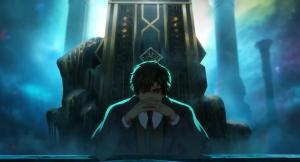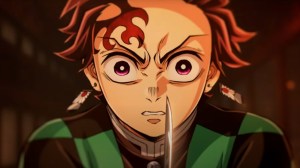So if you follow my posts closely, you’ll remember that not so long ago I discussed the wedding of Northstar and why exactly these things DO in fact matter. This year’s Comic-Con offers no shortage of discussion on the subject of gays in comics and just how they are represented and portrayed. One of the panels that addressed this was today, Thursday, as various representatives from throughout the comic book industry gathered to address the subject and just what the future holds for gay, lesbian, bisexual and transgendered characters.The description for the panel posed the question as to whether or not it’s time to rewrite the rules on how queer comic book characters are used and perceived. On hand to provide some answers to that very weighty question were Oliver Nome of Fathom: Kiani, Gail Simone of Batgirl and Secret Six, Nicola Scott of Earth 2 and Secret Six, James Robinson of Earth 2 and Justice League, Ivan Velez Jr. of Tales of the Closet, and moderator Charles “Zan” Christensen, the founder of Prism Comics, a now ten year old non-profit that seeks to support LGBT creators.The opening question: are we past the point of having to present overly sanitized versions of gay characters? Do gay characters today need to be solely devoted to being not too mean, not too off, or not too edgy. “I try to be truthful, not give a stereotype, to give layers to a character as much as possible, especially if we want the character to be around for awhile,” said Simone. She then added, “Fear would be a terrible reason not to go forward with an idea that was good, no matter what.” Velez added, “I had so many characters going in, and when I had a gay character in Blood Syndicate, it was a plot point. He didn’t come out until the tenth issue. Some people loved him, some didn’t, and I think it made the plot stronger.” Robinson chimed in as well, “I just try to write honest characters. That’s what I’m doing with Earth 2 at the moment. Unfortunately, in many parts of the world, many people are scared of gay people and that’s just the truth. I’m just trying to present positive, normal gay people to people who might not otherwise encounter gay characters in their fiction.”After Robinson’s answer, an interesting exchange between Robinson and Velez occurred, with Velez challenging Robinson’s notions of what constituted “extreme” gay culture. The two came to some common ground, but a little back and forth was observed, all friendly. Robinson continued, “I would still at this point be hesitant at introducing a gay villain. I still think at this point it’s not my place to do that. A gay writer could probably do that, but I don’t think I could.” Moving on, the death of characters can also be an interesting point to consider where gay characters are concerned. “I was thinking about this with Earth 2. I realized what one of the big influences with me was. I thought about Rocky Balboa and the fact that they killed off his wife. Her presence is felt even though she’s not in it. Sam’s presence in Earth 2 will be felt for awhile, even though he physically won’t be there, just like a man and a wife would feel the same thing.”Is there a tone to drawing a gay character? “You have to be drawn to the personality of the character. When I was drawing Scandal Savage in Secret Six, and I would give her a kind of masculine body language, but you wouldn’t call her butch because of her outfit. I drew her like I did Catman. I drew her post the love of her life being killed,” said Scott, “but when I was drawing characters like Alan and Sam, Alan just had to be this universal guy that everyone could fall in love with. That’s who he needs to be. He is the ultimate super-hero on Earth 2, and everyone is instinctively going to follow him. It was very clear to me what he needed to look like. Sam is a man of the world in his own way. He has to be beautiful because Alan is very beautiful. The dynamic between them, and I had to make this clear visually, that Alan was the top.” Laughter ensued, and Scott continued, “I just don’t see him as a twink or a more feminine kind of man.”In terms of response to the work these panelists have done with gay characters, Velez said, “I got responses from gang members that were supportive of the gay characters I wrote about. We had a transgender character too, and since she’s a shapeshifter, no one can tell. At Marvel when I did Ghost Rider, there was a minor character who said she didn’t like boys in a throwaway line, and I got lots of letters about that one line. It was very powerful. I think the fact that Milestone, who published Blood Syndicate, wasn’t in the mainstream, helped with the freedom of our work.” He said also that he has received nothing but love for the work he’s done with Tales of the Closet. Another question focused on the possibility of editorial influence on doing a lot more diversity, especially from the bigger companies. “In my experience, I just write it and if they don’t like it they tell me to take it out. I’ve heard other people get pressure to include more diversity, but I’ve never had that,” said Gail Simone. She continued, “with Secret Six I got tons and tons of positive feedback about the sexual diversity on the team. I love seeing couples coming to conventions dressed as Scandal and Knockout, and getting to feel included in the story. My original intention in comics was to include more female characters, and then I started seeing how much underrepresentation was going on in comics in general and started trying to as relatable and truthful as I could be.”Robinson said, “I’ve been encouraged to add a lot of diversity to Earth 2, and as we get into the life of Sam we’ll get a reintroduction of a character who will now be Asian. By Alan Scott being young we didn’t get his gay son, Obsidian, and so the idea of Alan becoming gay came from that.” Robinson did discuss that there had been some backlash from some about the gay Lantern, oddly, he noted, a lot from Brazil. “Maybe I should just make Alan’s next boyfriend from Brazil just to get back at them!” he joked. “We’re so used to getting not much from comics with diversity, and it’s frustrating that it takes so long,” added Velez. “I think the fact that the public now says that ‘oh, there’s a Green Lantern that’s gay’ is a good thing, because now they see it.”The conversation then turned to audience questions, with everything from why gay men love Batgirl to the evolution of introducing a gay villain eventually, and to the media in general and its depictions of gay men and women. Prism Comics will be doing more gay-themed events and panels throughout the weekend!
Comic-Con Panel: Rewriting the Rules for LGBT Characters in Comics
So if you follow my posts closely, you’ll remember that not so long ago I discussed the wedding […]










